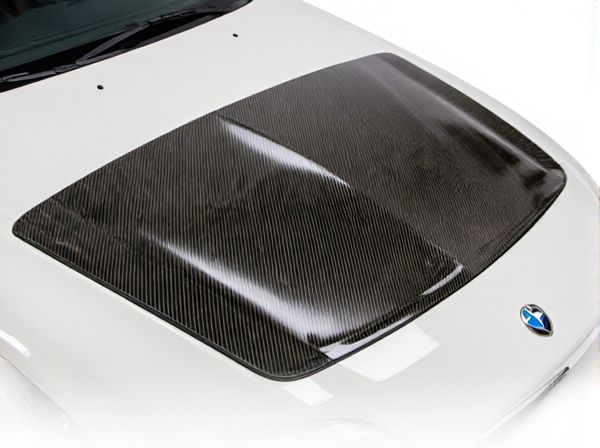
Photo illustration: Fiberglass Hood vs Carbon Fiber Hood
Fiberglass hoods offer a cost-effective and lightweight alternative to traditional steel, making them ideal for budget-conscious car enthusiasts seeking improved performance. Carbon fiber hoods provide superior strength, durability, and a sleek, high-tech appearance, enhancing both vehicle aesthetics and aerodynamics. Your choice between the two should consider factors like budget, weight savings, and the desired level of performance enhancement.
Table of Comparison
| Feature | Fiberglass Hood | Carbon Fiber Hood |
|---|---|---|
| Weight | Heavier, adds more weight | Lightweight, reduces vehicle weight |
| Durability | Prone to cracking, less impact resistant | Highly durable, impact resistant |
| Cost | More affordable | Expensive due to material technology |
| Appearance | Can be molded, less premium look | High-tech, glossy finish |
| Repairability | Easy to repair | Difficult and costly to repair |
| Heat Resistance | Moderate resistance | Excellent heat resistance |
Introduction to Fiberglass and Carbon Fiber Hoods
Fiberglass hoods are lightweight, affordable, and easy to mold, making them popular for custom car modifications and repairs. Carbon fiber hoods offer superior strength-to-weight ratio, enhanced durability, and a sleek, high-performance look favored in sports and race cars. Both materials improve vehicle aesthetics and performance by reducing overall weight compared to traditional steel hoods.
Material Composition and Manufacturing Differences
Fiberglass hoods are made from woven glass fibers embedded in a resin matrix, resulting in a lightweight but relatively heavier and less durable structure compared to carbon fiber. Carbon fiber hoods consist of carbon filaments tightly woven and bonded with epoxy resin, creating a material with superior strength-to-weight ratio and increased stiffness. Manufacturing fiberglass involves hand lay-up or molding of glass fabric and resin, while carbon fiber uses a more complex process of layering carbon sheets and curing under heat and pressure to enhance structural integrity.
Weight Comparison: Fiberglass vs Carbon Fiber
Carbon fiber hoods typically weigh 30-50% less than fiberglass hoods, making them significantly lighter and enhancing vehicle performance through improved acceleration and handling. Fiberglass hoods are heavier, often weighing around 10-15 pounds more, which can affect overall vehicle weight and fuel efficiency. The superior strength-to-weight ratio of carbon fiber contributes to its popularity among automotive enthusiasts seeking weight reduction without compromising durability.
Strength and Durability Factors
Carbon fiber hoods offer superior strength-to-weight ratios, providing exceptional rigidity and impact resistance while significantly reducing vehicle weight. Fiberglass hoods, though less expensive, tend to be more brittle and prone to cracking under stress or impact, resulting in lower durability. For applications requiring enhanced performance and long-term reliability, carbon fiber is the preferred material due to its advanced mechanical properties and resistance to wear.
Aesthetic Appeal and Finish Options
Fiberglass hoods offer smooth surfaces with the ability to be easily molded into various custom shapes, providing a versatile aesthetic appeal suitable for detailed paint jobs and finishes. Carbon fiber hoods feature a distinctive woven pattern that showcases a high-tech, premium look often left exposed with clear coats to highlight its texture. Both materials support diverse finish options, but carbon fiber typically emphasizes a glossy, natural weave appearance, while fiberglass allows for more traditional paint treatments and intricate design flexibility.
Performance Impact on Vehicles
Carbon fiber hoods significantly reduce vehicle weight compared to fiberglass hoods, enhancing acceleration, handling, and overall performance due to their superior strength-to-weight ratio. Fiberglass hoods, while more affordable and easier to repair, typically add more weight and lack the rigidity that carbon fiber offers, which can affect high-speed stability and responsiveness. The improved stiffness of carbon fiber also contributes to better aerodynamic efficiency, making it the preferred choice for performance-oriented vehicles.
Cost Analysis: Initial Price and Long-term Value
Fiberglass hoods typically have a lower initial price, ranging from $150 to $400, making them an affordable option for budget-conscious buyers, while carbon fiber hoods cost between $800 and $2500 due to advanced manufacturing and lightweight materials. Long-term value favors carbon fiber hoods because of their superior strength, durability, and resistance to warping or cracking, which can reduce the need for frequent replacements. Fiberglass may require more maintenance over time, leading to higher cumulative costs despite its lower upfront investment.
Installation Process and Compatibility
Fiberglass hoods typically offer easier installation due to their lightweight and flexible nature, making them compatible with most vehicle models without requiring modifications. Carbon fiber hoods provide superior strength and weight reduction but may demand precise fitment and additional adjustments to align with OEM mounting points, enhancing compatibility with performance-oriented vehicles. Choosing between fiberglass and carbon fiber hinges on balancing installation simplicity against tailored compatibility and durability.
Maintenance and Longevity Considerations
Fiberglass hoods require regular inspections for cracks and chips, as they are prone to damage from impacts and environmental exposure, necessitating timely repairs to maintain durability. Carbon fiber hoods offer superior resistance to wear and environmental degradation, reducing maintenance frequency but demand specialized care to prevent fiber splintering and UV damage, often involving protective coatings. Longevity of carbon fiber hoods generally exceeds fiberglass, with lifespan estimates of 10-15 years under normal conditions compared to 5-7 years for fiberglass, influenced by maintenance practices and exposure levels.
Choosing the Right Hood: Key Takeaways for Car Owners
Fiberglass hoods offer affordability and ease of repair, making them ideal for budget-conscious car owners seeking lightweight options. Carbon fiber hoods provide superior strength, enhanced durability, and a high-end aesthetic, suitable for performance enthusiasts willing to invest more. Evaluating factors such as cost, weight, durability, and visual appeal helps car owners select the optimal hood material aligned with their driving needs and style preferences.
 caratoz.com
caratoz.com